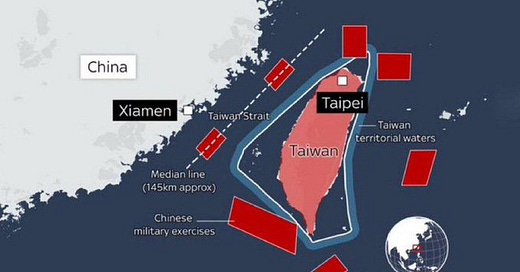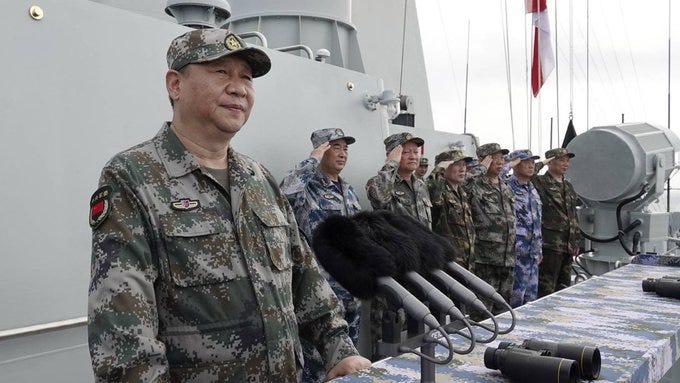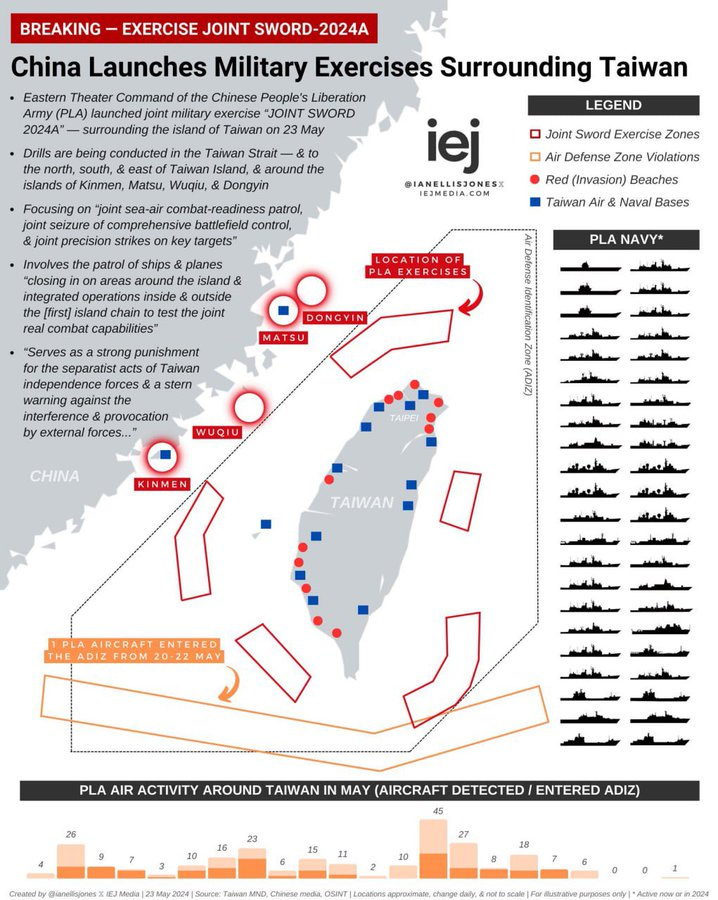China has been conducting military exercises around Taiwan—if we’re to believe both official PRC as well as official US positions, that means China has been conducting military exercises around a part of China. So, nothing to get excited about. Here are two perspectives, including interesting and informative maps:
Megatron @Megatron_ron
NEW:
China completely blockaded Taiwan with warships during the "Joint Sword 2024" exercise today
This is how it would look realistically if a conflict broke out between the island and the mainland China.
There will be a total naval blockade with submarines, and closed skies with China's air defense systems.
Unfortunately, Taiwan does not have Poland and Romania on its borders like Ukraine, so that weapons can flow freely inside. Everything will be over in a couple of months.
That is why China conducts such exercises and not "attack" exercises.
http://t.me/megatron_ron
12:47 PM · May 23, 2024
The US cannot break the Houthi blockade of the Red Sea. What serious person believes the US could break the blockade pictured above, especially given the close cooperation between Russia and China? The strategy presented here—blockade Taiwan into submission—makes sense. My view is in line with Doug Macgregor’s view—the US has no strategic interest here.
Follow the link here for a long thread on the exercises and the Taiwanese reaction. I’ll go with the blockade strategy rather than the invasion scenario. China has no desire to go in and break everything:
BREAKING: Source says China will invade Taiwan in early June. As of now the Chinese military have begin drills surrounding entirety of Taiwan, including islands of Kinmen and Dongyin, state media says
Again. I don’t insist on the analysis here, but the map is a good one:
Taiwan is China, and the United States does recognize, at least publicly, the One China policy. So why are we trying to weaponize it? Taiwan’s importance to the US lies once again in its location. Taiwan serves as an 'unsinkable aircraft carrier' off the coast of China, meaning it could be used as a military base in case of a conflict with China. Additionally, Taiwan is strategically located in the Asia-Pacific region. Most importantly, Taiwan has access to the South China Sea. The one who controls the South China Sea controls the trade of several million barrels of oil per day and other goods that transit through its waters. If the US loses Taiwan, it loses one of the most powerful trade routes; one-third of all global trade passes through the South China Sea. The US does not care about Taiwan nor its independence claims; it cares about losing trillions of dollars in trade…
Lastly. Taiwan is too closely tied, economically, to China for Taiwan to seriously engage in a full scale war. It will need to come to some accommodation. Not too long ago I remarked in a comment that Taiwan has long outsourced a huge amount of its key semi-conductor industry to China. Now consider this—and, again, I don’t insist on the worst case scenario here, it’s simply that a military solution is not a solution:
Arnaud Bertrand @RnaudBertrand
This is absolutely incredible. If you're still under the illusion that the US has any hope of stopping China's progress in semiconductors, you have to watch this.
This is Philipp Wong, Chief Scientist at TSMC [Taiwan Semiconductor Manufacturing Company] and legendary Professor of Electrical Engineering at Stanford University. He's undoubtedly one of the, if not THE world's leading scientific figure in the field of semiconductors.
Here's what he says [follow the link below for the full 3 minute video out-take that is summarized here]:
"Years ago we had technical conferences and we see papers from China. Ah forget it! Just... Quality is so bad it's not even competitive. That was probably in the 80s and the 90s. Now they're better than us. They're better than us!
If you look at papers, publications, data from key conferences in the chips business. [...] You basically flipped. Years ago the US had the majority of the papers. I remember there were roughly about 40 to 50% of the papers from the US. And China, maybe 20-30 years ago, they were nowhere to be found. Today, China and Asia, the papers, are more than 40%, almost close to 50%. And the US has steadily declined from 40-50% to 30 to 40%. And the rest of the world, principally Europe and Japan has basically fallen off a cliff.
So the research and development, the research capability in Asian countries, China, Korea, Taiwan, Singapore and so on have really become the strongest region. In terms of producing good quality research. I'm not just talking about quantity, it's quality.
The only thing that I see... What the US is still little bit ahead is in coming up with the new ideas. What the Chinese always say: going from zero to 1. Namely starting from nowhere, nothing, and come up with this really new idea. And if I look at what I would call new idea that has not been discussed before, the US still is the principal place where these new ideas come from. But once these new ideas become known, then... I feel it in my everyday research with my students. Any new ideas that we come up, once they become known... that this is a good idea. The next week it will show up in China. It will show up in China, only that they do it better than you.
I can't, cannot compete anymore. They have better resources, they have more students. They have more, more funding from the government. I cannot compete anymore. I have to get out of that field!"
If you’re interested, here’s the full hour and a half video:
America vs Everybody: Will The US Win The Chip Race? - Philip Wong
America has a lot of urgent problems. I don’t see any of them being solved through warfare.






https://www.zerohedge.com/geopolitical/current-pla-drills-around-taiwan-are-bigger-scope-exercises-triggered-pelosi
These are major military exercises by China around Taiwan, with more "exclusion zones" that are larger in scale than the exercises triggered by Pelosi's visit and closer to the island.
They are basically demonstrating that they can completely blockade the islands, with the zones placed in front of Taiwan's biggest ports (like Kaohsiung to the South, where a lot of Taiwan's navy is, or Hualien to the East), as well as protect the mainland at the same time. It's not a sign of imminent war, simply a reaction to Lai's presidential inauguration speech where he hinted at significant changes to the status quo towards independence, so much so that even the Financial Times ran an article saying that "China has a point" when they were warning about Lai's intention to change the status quo.
Wow, that's exceedingly rare. The FT admits that the ROC's new leader Lai Ching-te is attempting the change the status quo across the Taiwan strait and that "China has a point" in this regard.https://t.co/cfuMnnLNBs
Here is what they write:
"China is right to say that Lai is…
— Arnaud Bertrand (@RnaudBertrand) May 22, 2024
This is China telling him "don't get any ideas".
Taiwan's President just got inaugurated on May 20th. This is just China being China, and giving a reminder to Taiwan's new President about the balance of Power. China has been doing lots of showing of forces around Taiwan for a while. It does not get covered in the US media, but the Taiwan Media covers it.
There are only certain times of year that the weather makes sense for an invasion, and the weather windows per some are around April and October. So it's unlikely in June.